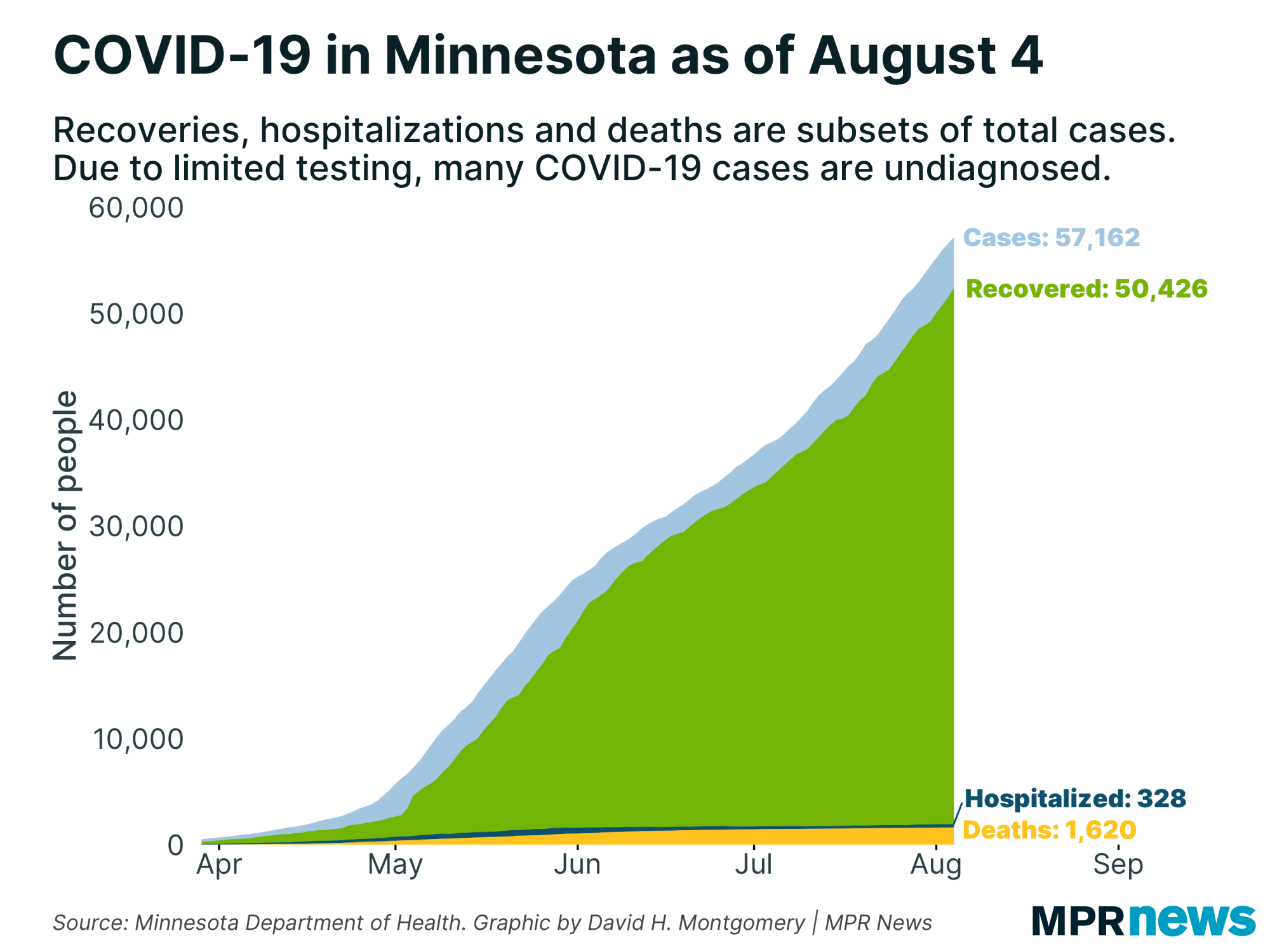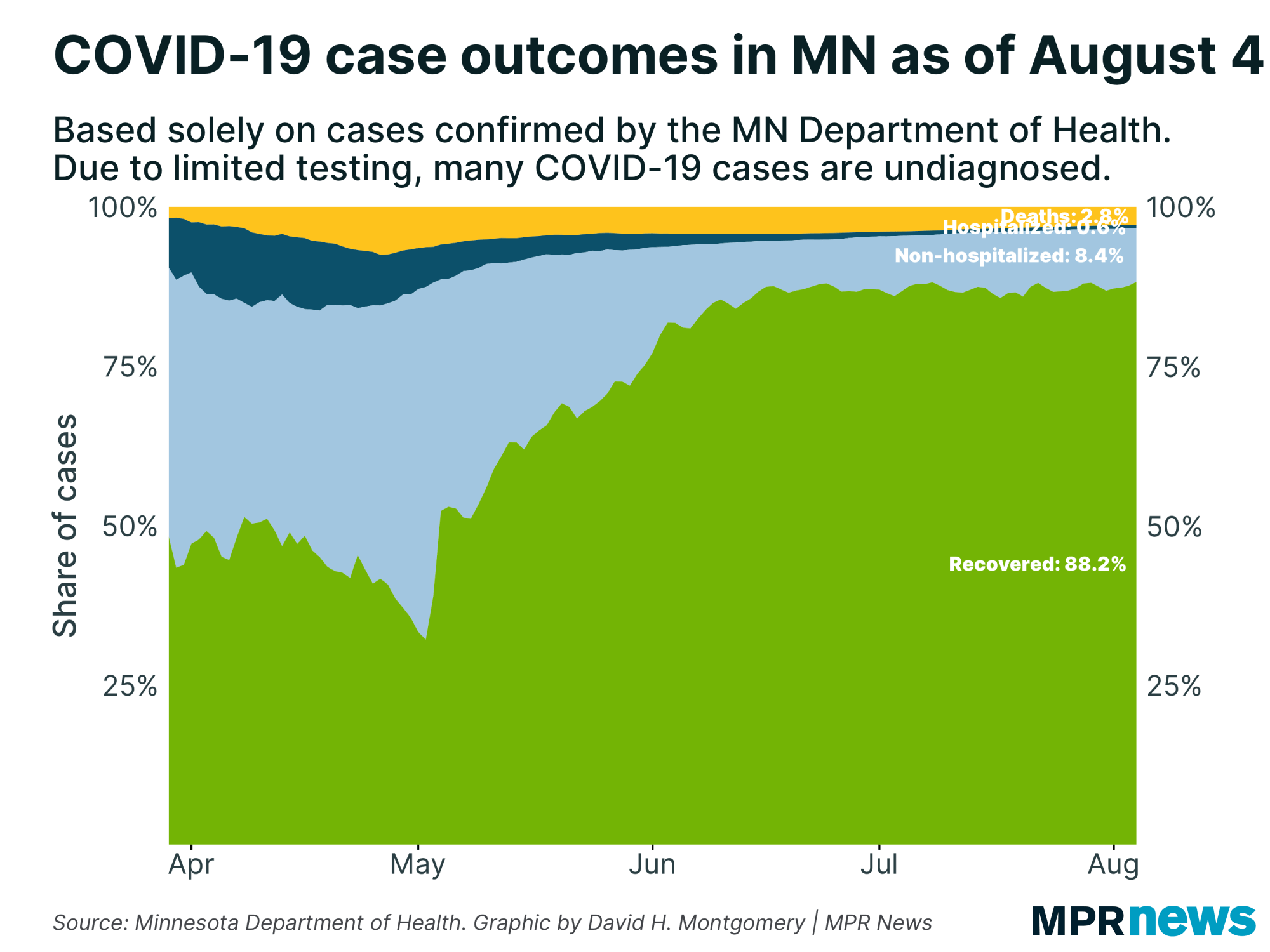May 24 update on COVID-19 in MN: Confirmed cases climb past 20,000
As rules are relaxed, state leaders say risk remains

Go Deeper.
Create an account or log in to save stories.
Like this?
Thanks for liking this story! We have added it to a list of your favorite stories.
Updated: 11:17 a.m.
As crowds lined up for a second day of free COVID-19 testing at six National Guard armories around Minnesota on Sunday, the state saw its number of confirmed cases climb past 20,000.
The death toll now stands at 869.
The Minnesota Department of Health on Sunday reported 730 more confirmed COVID-19 cases in the state, for a total of 20,573. The state reported 8,471 completed tests — the second day in a row with a total exceeding 8,000.
Officials reported the deaths of 17 more Minnesotans from COVID-19; 12 of those people were residents of long-term care facilities, which have seen the majority of deaths from the disease in Minnesota.
Turn Up Your Support
MPR News helps you turn down the noise and build shared understanding. Turn up your support for this public resource and keep trusted journalism accessible to all.
The number of people hospitalized dropped to 553, down from a record high — 568 — in Saturday’s report.
The number of people being treated in ICUs dropped to 207, from 215 on Saturday.
About 64 percent of people who have been diagnosed with COVID-19 in Minnesota have recovered to the point where they no longer need to be isolated.

Minnesota Gov. Tim Walz on Saturday announced new guidance for places of worship, allowing churches, mosques and synagogues to resume services starting Wednesday as along as they keep gatherings to no more than 25 percent of building occupancy.
But state health officials say those new rules — and other recent easing of stay-at-home measures — don't mean the worst of the COVID-19 pandemic has passed.
"Large gatherings continue to present a clear, documented risk for increasing the spread of COVID-19. We continue to see pretty rapid increases in our numbers of cases and deaths," State Health Commissioner Jan Malcolm said Saturday at a press briefing with Walz. "So even though we are slowly and carefully trying to open up opportunities for Minnesotans to resume activities that are so important ... this does not mean we're on the other side of this."
"I think it's going to be very difficult over the next couple weeks. It is my belief we are going to see some pretty rough weeks when we head to that peak no matter what we do," Walz cautioned.
Malcolm said some Twin Cities hospitals have had to start using so-called surge capacity.
"Our Level 1 trauma centers have had to activate additional beds, which is really important because we need those Level 1 trauma centers, obviously, to be able to fulfill their entire missions, and not only be full with COVID cases," she said.

Free COVID-19 testing will continue Sunday and Monday at six National Guard armories across Minnesota.
It started on Saturday in Minneapolis, St. Paul, Duluth, Moorhead, St. James and Faribault.
At the Minneapolis location, there was a line when testing started Saturday morning with wait times estimated at 2 to 3 hours. National Guard officials reported later Saturday that wait times had decreased.
"We are glad to see” the strong turnout, Malcolm said Saturday. “I know that people are waiting in lines and there's an awful lot of demand there — and we're learning a lot from today's events that will help us to be even better at getting testing out into the community."

Developments from around the state
Minneapolis to require face masks in indoor public places
Starting next week, people in indoor public places in Minneapolis will be required to wear a face covering.
Mayor Jacob Frey announced the measure on Thursday as the latest in a series of emergency regulations designed to halt the spread of COVID-19. The regulation will take effect next Tuesday.
Frey said business owners will be able to refuse entry to anyone who's not wearing a face covering. The rule would apply to indoor public places in Minneapolis, not outdoor venues.
People can call 311 to report noncompliance, the mayor said. Violations could be punished by fines up to $1,000.
"We are not criminalizing forgetfulness. We are not penalizing people for a lack of awareness. We are approaching the implementation of the policy with grace and patience,” said Frey. “We are prioritizing outreach and education."
On Friday, Frey said that the city has purchased more than 9,000 cloth masks with money from the budgets for council members and the mayor's office. More masks are needed, however, especially in light of the new emergency regulation, Frey said.
The mayor encouraged people to take part in a Memorial Day mask drive, during which people can drop off donated masks at fire stations across Minneapolis.
— Brandt Williams | MPR News
Top headlines
Poll finds most Minnesotans support stay-home measures, but state is divided: A majority of Minnesota voters support the restrictions on everyday life the state imposed to try to combat the COVID-19 pandemic, according to a new MPR News/Star Tribune/KARE 11 Minnesota Poll. But a solid minority feels the state has gone too far.
Minnesota Muslims prepare for a socially distanced Eid: The Eid celebration this year won’t be what it used to be. There are no big festive gatherings at homes, no dining at all-you-can-eat restaurants and no hanging out at the Mall of America and Valleyfair for kids and teens.
Efforts aim to share COVID-19 info, help in St. Cloud's Somali-speaking community: As the number of cases of COVID-19 in the St. Cloud area continues to climb, an effort is underway to reach out to the region’s Somali American community with information and assistance.
It was hailed as the 'Minnesota moonshot' — but why hasn’t antibody testing taken off? One reason state health officials say they have been reticent to suggest widespread testing is reliability. In addition to the Mayo and U of M tests, private companies have also developed their own antibody testing. State officials say there are tests on the market that don’t produce reliable results.
More Minnesotans flocking to food shelves: As more Minnesotans lose their jobs because of COVID-19, local food shelves are seeing a surge in first-time visitors needing emergency food services — and the demand doesn’t look like it’ll let up anytime soon. About 1 in 3 Minnesotans say they’re worried about affording groceries and healthy food.
COVID-19 in Minnesota
Data in these graphs are based off Minnesota Department of Health cumulative totals released at 11 a.m. daily. You can find more detailed statistics on COVID-19 at the Health Department website.
The coronavirus is transmitted through respiratory droplets, coughs and sneezes, similar to the way the flu can spread.
Government and medical leaders are urging people to wash their hands frequently and well, refrain from touching their faces, cover their coughs, disinfect surfaces and avoid large crowds, all in an effort to curb the virus’ rapid spread.


